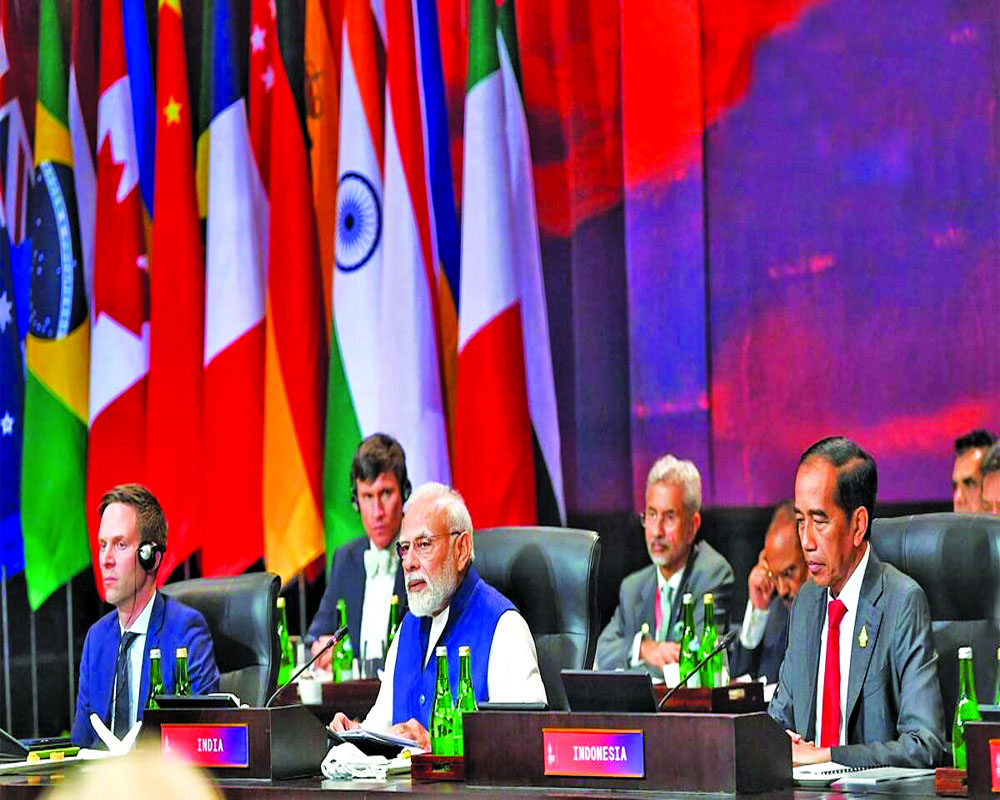Global institutions have not lived up to the expectations; their response to the recent pandemic, conflict, climate change has been less than satisfactory
Recently Prime Minister Narendra Modi, while addressing the the conference of Foreign Ministers of G-20 countries, has given a significant statement that multilateralism is in crisis today. Foreign Minister Jaishankar has also echoed similar sentiments. Significantly, ever since India took over the presidency of G-20 countries, discussions on many issues including global institutions are gaining momentum in the world.
Global institutions, mostly from the UN system, have been recognized to have a formidable role, earlier in the first bipolar world after World War II and even later in the uni-polar world led by the United States. In times of conflicts, natural or man-made disasters or even in normal times on issues faced by humanity; the countries of the world have been looking towards the United Nations and its several other bodies. Not only International Labor Organization, World Health Organization, World Bank, International Monetary Fund, UNESCO, United Nations Development Program (UNDP) etc. have had a special role in the world. GATT before 1995 and later WTO have been known as the rule makers for governing world trade.
But today, questions are being raised on not only the functioning of these organizations and institutions, their capacity for global leadership, but also on their intentions. The capacity of global governance of these institutions has come under scrutiny amidst pandemics, conflicts, climate change and increasing food insecurity in the world and increasing and unsustainable debt in many countries. From the beginning of the pandemic to its management, the The World Health Organization has not only proved to be a failure but has also been seen to be blatantly biased in favour of China. From ILO to UNDP, all the other organizations of the United Nations, rather than being institutions of global governance, are turning out to be no more than talking shops.
For example, the World Health Organization, which was expected to fulfil its responsibility of protecting people’s health in the world at the time of the pandemic, could not even give an unbiased opinion about the origin of the Covid19 pandemic. When there was a natural expectation in the world that patents on medicines, vaccines and medical equipment needed for the treatment of people during the Corona pandemic, should be suspended and all types of treatment and vaccines should be available free of royalty, to the people, then the WTO's Trade Related Intellectual Property Rights (TRIPS) Council, first failed to decide on the matter; and later also when the decision of relief was made, it was too late and too little. This has exposed the gross insensitive functioning of the World Trade Organization towards humanity, amidst the dominance of MNCs and developed countries.
Every year 'United Nations Climate Change Convention (COP) is organized by the United Nations, which discusses the issue related to climate change and its solutions thereof. For this, at a climate change conference held in Kyoto, Japan, it was agreed that by the year 2012, countries with high emissions of greenhouse gases will have to reduce their emissions, while others were expected to keep their emissions at the same level and some others were also allowed to increase emissions keeping in view their growth needs. This agreement is also known as the 'Kyoto Protocol'.
Though this treaty was honoured by member countries, many conferences held after Kyoto, could not make any headway including the latest United Nations Climate Change Conference, that is, COP27, which concluded only in November 2022. A few years ago, an agreement was reached at this conference that the world's rich countries would provide US$ 100 billion every year to developing countries so that they could build capacity in their respective countries to manage issues related to climate change.
The reality is that while there is a need for huge investment and usage of modern technology to overcome global warming, the developed countries have so far failed to discharge their responsibility and the United Nations and its conventions and Institutions are proving to be no more than talking shops in this regard, organising conferences and discussions. Most of these global institutions are more than 75 years old and have lost their relevance.
Today, When India assumed the presidency of G-20 countries, it was the need of the hour to underline the need for new thinking and a new global governance system to find solutions to the challenges before the world. In the constitutions of the present global institutions, ideals like international brotherhood, peace, development and cooperation are much highlighted, but they are only in papers, the reality is that the big countries of the world themselves are not following these principles. Significantly, the G-20 group, which is the most powerful group of the world's big nations today, from where 85 per cent of the world's GDP comes, where two-thirds of the world's population lives in these countries and from where 75 per cent of the world's total trade comes. India has chosen the theme of ‘One Earth, One Family, One Future’ in the year of the presidency of G-20 countries. To realise this theme, we will have to motivate the world towards a new global order, with an objective of global consensus to solve problems like financial instability, terrorism, conflicts and food and energy insecurity in the world. It remains to be seen how far we move in this direction in the coming months at various level meetings and conferences of the G-20 group of countries. We have to decipher what PM Modi has said that the current global governance and institutions have failed to deal with the global financial crisis. G20 nations are expected to make meaningful efforts, to deal with the impending crisis on humanity and bring prosperity to the world.
(The author is Professor, PGDAV College, University of Delhi)


























